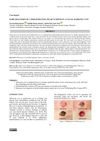 October 2022 in “Journal of experimental and clinical medicine”
October 2022 in “Journal of experimental and clinical medicine” Repurposing existing drugs for COVID-19 shows promise but requires more research to confirm effectiveness.
 August 2022 in “International Journal of Health Sciences (IJHS) (En línea)”
August 2022 in “International Journal of Health Sciences (IJHS) (En línea)” Oxidative stress is important in causing alopecia areata.
 December 2021 in “Dermatology research”
December 2021 in “Dermatology research” Low levels of vitamin B12, ferritin, and calcium are linked to premature graying of hair.
 January 2016 in “Springer eBooks”
January 2016 in “Springer eBooks” A 19-year-old male with delayed puberty was successfully treated for a condition that prevents normal hormone production.
 August 2024 in “Quality in Sport”
August 2024 in “Quality in Sport” PRP helps with skin, hair, and wound treatments but needs more research for standard use.
 June 2024 in “Al- Anbar Medical Journal”
June 2024 in “Al- Anbar Medical Journal” Acute telogen effluvium can be resolved by addressing causes, but chronic telogen effluvium is harder to treat.
 March 2024 in “PLoS medicine”
March 2024 in “PLoS medicine” Physical activity, height, and smoking affect prostate cancer risk.
 February 2024 in “PloS one”
February 2024 in “PloS one” Tofacitinib and adalimumab are promising treatments for cicatricial alopecia with few side effects.

New insights into cell communication in psoriasis suggest innovative drug treatments.
 December 2023 in “Revista de la Facultad de Ciencias Médicas (Quito)”
December 2023 in “Revista de la Facultad de Ciencias Médicas (Quito)” Fever and rash can be early signs of lupus.
 September 2023 in “Journal of movement disorders”
September 2023 in “Journal of movement disorders” Dopaminergic therapy in Parkinson's disease patients is linked to increased hair loss.
 September 2023 in “International journal of science and healthcare research”
September 2023 in “International journal of science and healthcare research” Genetic testing is crucial for diagnosing congenital atrichia, a rare condition causing irreversible hair loss.
 August 2023 in “JOJ dermatology & cosmetics”
August 2023 in “JOJ dermatology & cosmetics” Antibiotics often cause skin reactions, making them a major health concern.
 July 2023 in “International journal of pharmacognosy and life science”
July 2023 in “International journal of pharmacognosy and life science” The herbal hair oil made from various plants might be a good alternative to synthetic hair loss treatments.
 April 2023 in “IP Indian journal of clinical and experimental dermatology”
April 2023 in “IP Indian journal of clinical and experimental dermatology” Lichen planus is a chronic autoimmune disease that is hard to treat and more common in women.
 August 2022 in “Frontiers in genetics”
August 2022 in “Frontiers in genetics” A new genetic change in the DSC3 gene is linked to a rare condition causing hair loss and skin blisters in a child.
 June 2022 in “Organic communications”
June 2022 in “Organic communications” Natural compounds, especially Withaferin-A, may help treat post-COVID-19 complications, but some may have side effects.
 April 2022 in “Research Square (Research Square)”
April 2022 in “Research Square (Research Square)” The combination of laser and topical steroids is more effective for treating alopecia areata than topical steroids alone.
 March 2022 in “Folia Medica Indonesiana”
March 2022 in “Folia Medica Indonesiana” The lump on a woman's scalp was a rare, potentially cancerous tumor from the hair follicle, not a common cyst.
 June 2021 in “bioRxiv (Cold Spring Harbor Laboratory)”
June 2021 in “bioRxiv (Cold Spring Harbor Laboratory)” The gene Tfap2b is essential for creating a type of stem cell in zebrafish that can become different pigment cells.
 April 2021 in “Advances in Cosmetic Surgery”
April 2021 in “Advances in Cosmetic Surgery” Hair restoration can be achieved through non-surgical treatments like minoxidil, antiandrogens, phototherapy, and PRP procedures, or through surgical methods like hair transplantation. Continued treatment is needed to maintain results, and full results are visible after 12-18 months.
 February 2021 in “Journal of pharmaceutical and biological sciences”
February 2021 in “Journal of pharmaceutical and biological sciences” No cure exists for alopecia areata, and treatments are personalized.

Silk sericin dressing with collagen heals wounds faster and improves scar quality better than Bactigras.
 November 2020 in “Bali Medical Journal”
November 2020 in “Bali Medical Journal” PRP may help hair growth in alopecia areata without major side effects, but more research is needed.
 June 2020 in “Journal of Dermatological Treatment”
June 2020 in “Journal of Dermatological Treatment” Use telemedicine and strict hygiene for safe hair and scalp treatments during COVID-19.
 January 2020 in “Asian journal of applied science and technology”
January 2020 in “Asian journal of applied science and technology” Good nutrition is crucial for health and preventing disease, and supplements can help prevent nutrient deficiencies.

Topical calcipotriol successfully treated hair loss in three patients with Alopecia Totalis.
 November 2019 in “Harper's Textbook of Pediatric Dermatology”
November 2019 in “Harper's Textbook of Pediatric Dermatology” The document is a detailed medical reference on skin and genetic disorders.

The document is a detailed guide on skin conditions and treatments for dermatologists.






























